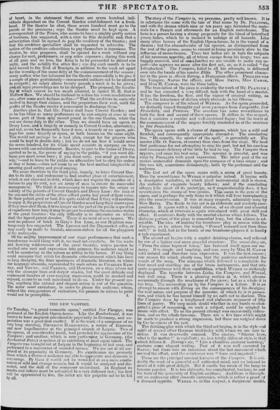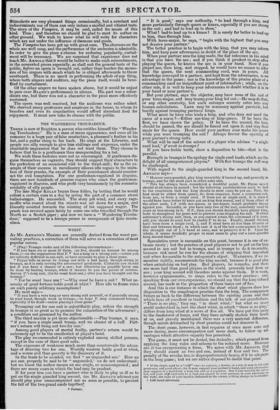THE NEW VAMPIRE.
ON Tuesday, "a grand romantic opera," entitled Der Vampyr, was produced at the English Opera-house. Like the Rauberbraut, it was known to have acquired considerable popularity in Germany, and ex- pectation was a good deal excited. It is the work of a composer of no very long standing, HEINRICH ManscHeina, a native of Hanover, and now kapellmeister at the .principal church at Leipzic. Two of his operas, of considerable merit, had preceded the appearance of the Vampire; and another, which is now performing in Germany, (the Enchanted Rose,) is spoken of as exhibiting at least equal talent. The Vampire was brought out at Leipzic the beginning of last year, and performed to a succession of crowded houses. We are not at all sur- prised at its popularity in Germany. Its excellencies are precisely those which a German audience are able to appreciate and desirous to encourage. By them it would not he wondered at as a mere combi- nation of wild and strange sounds, but it would be analyzed and dis- sected, and the skill Of the composer understood. In England its merits and detbets must be submitted to a very different test ; the first will be appreciated by few, the latter are too palpable not to be felt by all. The story of the Vampire is, we presume, pretty well known. It is in substance the same with the tale of that name by Dr. Po LIDORI, and with the drama which nine or ten years ago furnished the mate- rials for a French and afterwards for an English melodrame. The hero is a person having a strong propensity for the blood of betrothed young ladies, which he is inclined to indulge at all hazards. Like many other heroes of the English Opera-house, he is the vassal of a daimon ; but the characteristic of his species, as distinguished from the rest of the genus, seems to consist in being peculiarly alive to the influence of moon-beams. Three fair ladies are in turn the subjects of his ravenous appetite,. all of Whom escape from his fangs; two are happily married, and of one(laAthe) we are unable to make any re- portshe appears no more after the first act, or, as it is called " the Introduction." The Vampire, foiled in all his attempts, is delivered over into the hands of his master Eblis. The other prominent charac- ter in the piece is Alexis Zeriny, a Hungarian officer. PHILLIPS was the Vampire, SAPIO the officer, and Miss BETTS, Miss CAWSE., and Miss H. CAWSE, were the three ladies.
The translation Of the piece is evidently the work of Mr. PLANCHE and he has executed a very difficult task with the hand of a master. It has the freedom, the flow. and the vigour of original writing, as well as the luxuriance of diction which abounds in his Oberon.
The composer is of the school of WEBER. As the opera proceeded, we distinctly traced thoughts and even passages from Euryanthe, Der Freisrki;tz, and Preciosa. The oveiture has sonic resemblance to both the first and second of these operas. It differs in this respect, that it contains aregnlar and well-contrived fugue ; but the burst at the commencement of the =Ore forcibly reminded us of the overture to Der Freischiitz.
The opera opens with a chorus of daemons, which has a wild and fiendish, and consequently appropriate character:- The concluding line, " He cometh, the master of the spell," is powerfully set. The master (Mr. 0. SMITH, of course) then rises from the stage. We laud that gentleman for not attempting to sing his part, but not his careless and inaccurate delivery of the little he had to say. The Vampire then appears, and sings his best song. The opening is graceful, and was sung by PHILLIPS with great expression. The latter part of the air makes unmerciful demands upon the compass of a bass singer' and this was felt, sometimes distressingly, both by the performer and the audience.
The first act of the opera opens with a scena of great beauty. Here the resemblance to WEBER is palpable indeed. It begins with a descriptive recitative, in which great instrumental skill is shown. An andante of exquisite beauty follows ; and if the . concluding allegro fells short of its prototype, as it unquestionably does, it has nevertheless the stamp of true genius.. T,his swiva is the gem of the opera, and is perhaps the only thing in it which will bear transplanting into the concert-room. It was in many respects, admirably sung by Miss BETTS. The finale to this act is an elaborate and masterly com- position. It opens with a bridal chorus, of an elegant and cheerful character, which at intervals is again introduced with great skill and effect. It contrasts finely with the martial chorus which follows. The dialogue portion of the piece is somewhat long, but the climax is ad- mirable. The idea of making the trombone play in unison with the Vampire, as he utters the words, "Peace! rememb'rest thou thine oath s" is bold, but in the hands of our trombone-players it is hardly
a safe experiment. •
The second act begins with a capital drinking-chorus, well relieved by one of a lighter and more graceful structure. The succe:ding air, " From the ruins' topmost tower," has fastened itself upon our me mory. It is simple and touching, and was sung by Miss H. Cawsw with natural and therefore true expression. It was the first encore; one reason for which clearly was, that the audience understood the words of the song. The romance which followed is remarkable for that novel and startling use of the brass instruments, and that inti- mate acquaintance with their capabilities, which Masa so strikingly displayed. The terzetto between Liska, the Vampire, and Wenzel, was well sung. There is a pleasing motivo in it, which gleams occasionally through the .murkiness of the piece ; but as a whole it is too long. The succeeding air by the Vampire is a failure. It is an attempt to reason with ieriny on the consequences of his divulging thereal nature and purpose of the monster, of which he is in posses- sion, and which he has bound himself by an oath not to disclose. This the Vampire does by a lengthened and elaborate argument of fifty lines of poetry. We very much doubt whether in any hands so elon- gated a piece of reasoning, on such a subject, could be adapted to music with effect. To us the present attempt was occasionally ridicu- lous, and on the whole tiresome. There are a few bars which might be made to produce a strong impression, but these are weighed down by the heaviness of the rest. The drinking-glee with which the third act begins, is in the style and spirit of several other German trinldieder with which we are now fa- miliar. It was deservedly encored. The chcrus, "Silence here, what is the matter" is excellent ; as, in a totally different style; is that which follows it. Zeriny's. air, " Like a cloudless summer morning," contains some elegant writing. Part of it was well executed by SAPIO ; but there was an indecision about the last movement which' marred the effect, and the conclusion was " lame and impotent."
These are the principal musical features of the Vampire. It is evi- dently the work of a powerful and cultivated mind, and we listened to much of it with great delight. But it smells too much of the lamp to become popular. It is too elaborate, too complicated, too long, to suit the taste of the generality of English auditors. And there is through- out an endeavour after uncouth harmonies, which is rather a proof of a diseased appetite. WEBER is, in this respect, a dangerous model. Stimulants are very pleasant things occasionally, but a constant and indiscriminate use of them can only induce a morbid and vitiated taste. The story of the Vampire, it may be said, called for music of this kind. True ; and therefore we should be glad to meet its author on other ground. We wish to know what he will write for characters which are not under the influence of demons and gouls. The Vampire has been got up with great care. The choruses on the whole are well sung, and the performance of the orchestra is admirable. In order to give the piece a chance for enduring popularity, curtail- ment will be necessary. We are surprised that experience does not teach Mr. ARNOLD that it would be better to make such retrenchments, in the concerted pieces especially, as shall suit the general taste of the public, before an opera is brought out, rather than burden the memo- ries of his singers with much which he is obliged afterwards to throw overboard. There is no merit in performing the whole of any thing, where both singers and auditors, nay the piece itself, would be bene- fited by curtailment. Of the other singers we have spoken above, but it would be unjust to pass over BLAND'S performance in silence. His part was a subor- dinate one, but there was not a character in the piece more effectively sustained.
The opera was well received, but the audience was rather select. We oberved many professors and amateurs in the house, to whom its beauties and even its singularities would afford abundant food for enjoyment. It must now take its chance with the public.



















 Previous page
Previous page